Alfred Charles Auguste Foucher (1865–1952), was a French scholar, who argued that the Buddha image has Greek origins. He has been called the "father of Gandhara studies", and is a much-cited scholar on ancient Buddhism in northwest Indian subcontinent and the Hindu Kush region.

Casavant Frères is a Canadian organ building company in Saint-Hyacinthe, Quebec, which has been building pipe organs since 1879. As of 2014, the company has produced more than 3,900 organs.
Carl Frei was a German organ builder, composer and music arranger who founded a company that manufactured fairground and street organs.

"Frère Jacques", also known in English as "Brother John", is a nursery rhyme of French origin. The rhyme is traditionally sung in a round.

Jean Chrétien Ferdinand Hoefer was a German-French physician and lexicographer. He is now known for his many works on the history of science.
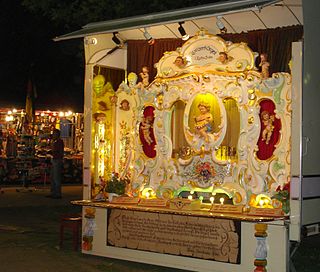
A fairground organ is a musical organ covering the wind and percussive sections of an orchestra. Originated in Paris, France, it was designed for use in commercial fairground settings to provide loud music to accompany rides and attractions, mostly merry-go-rounds. Unlike organs for indoor use, they are designed to produce a large volume of sound to be heard above the noises of crowds and fairground machinery.
Gasparini is an Italian surname and may refer to:

Armand Peugeot was a French industrialist, pioneer of the automobile industry and the man who transformed Peugeot into a manufacturer of bicycles and, later, of automobiles. He was accepted into the Automotive Hall of Fame in 1999.
Gavioli & Cie were a Franco–Italian organ builder company that manufactured fairground organs in both Italy and later France.
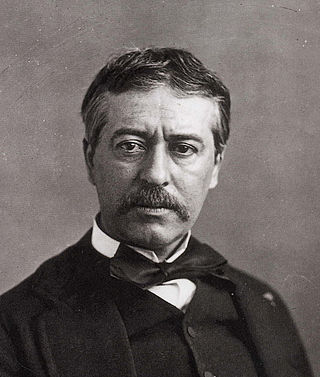
Jean-François-Maurice-Arnauld Dudevant, known as Baron Dudevant but better known by the pseudonym Maurice Sand, was a French writer, artist and entomologist. He studied art under Eugène Delacroix and also experimented in various other subjects, including geology and biology.
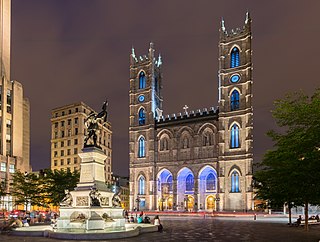
Notre-Dame Basilica is a minor basilica of the Catholic Church in the historic Old Montreal district of Montreal in Quebec, Canada. It is located at 110 Notre-Dame Street West, at the corner of Saint Sulpice Street. It is situated next to the Saint-Sulpice Seminary and faces the Place d'Armes square.

Pierre-Louis-Philippe Dietsch was a French composer and conductor, perhaps best remembered for the much anthologized Ave Maria 'by' Jacques Arcadelt, which he loosely arranged from that composer's three part madrigal Nous voyons que les hommes.

Paul-Henri Foucher was a French playwright, theatre and music critic, political journalist, and novelist.
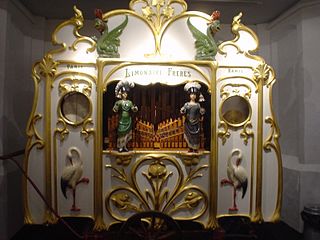
Limonaire Frères were an amusement ride, street organ and fairground organ builder, based in Paris, France, during the 19th and early 20th century.

The North Tonawanda Barrel Organ Factory was a street organ manufacturing company and building, located in North Tonawanda, New York. Started by expatriate German Eugene de Kleist with backing from Allan Herschell, the company was later purchased by the Wurlitzer company.

Revillon Frères was a French fur and luxury goods company, founded in Paris in 1723. Then called la Maison Givelet, it was purchased by Louis-Victor Revillon in 1839 and soon, as Revillon Frères, became the largest fur company in France. Branches were opened in London in 1869 and in New York in 1878. At the end of the 19th century, Revillon had stores in Paris, London, New York City, and Montreal.
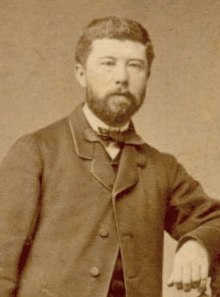
Gabriel-Auguste Ancelet was a French architect who undertook various projects for the Emperor Napoleon III, and later taught for many years at the École des Beaux-Arts in Paris.
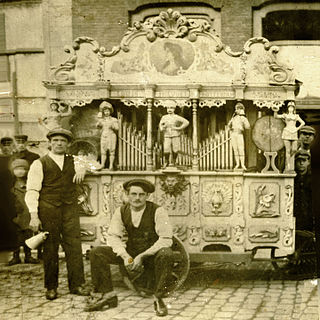
Draaiorgel de Vijf Beelden, or De Vijf Beeldenkast was a Dutch street organ with 52 keys.

Julie Hugo was a 19th-century French painter.
Traditional French musical instruments, known as instruments traditionnels in French, are musical instruments used in the traditional folk music of France. They comprise a range of string, wind, and percussion instruments.















